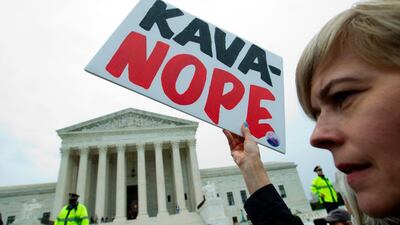Senate Republicans are ploughing forward with a committee vote on Friday on Brett Kavanaugh's nomination.
Voting at the Senate Judiciary Committee comes after an extraordinary and highly emotional hearing over Christine Blasey Ford's allegations that Mr Kavanaugh sexually assaulted her when they were teens. The marathon session appears to have only deepened the partisan divide.
The Judiciary committee is narrowly split with the slimmest Republican majority. And Democrats are expected to oppose President Donald Trump's nominee.
But even if the panel deadlocks over recommending Mr Kavanaugh, the nomination can push forward. The full Senate may start taking procedural votes as soon as Saturday toward confirmation next week.
Senate Majority Leader Mitch McConnell says the committee's going to vote on Friday and "move forward."
_________
Read more:
Donald Trump calls second Kavanaugh accuser ‘messed up’
Brett Kavanaugh promises that 'false accusations' will not force him to drop out
_________
On Thursday Supreme Court Justice Elena Kagan declined to talk about the confirmation process.
"I think given the events of today that's the one question I'm not going to answer," Justice Kagan told law students during an appearance at the University of California, Los Angeles. "We're right in the middle of events that are swirling around and I just want to leave it at that and make no news with respect to anything I say."
Ms Kagan spoke as the Senate Judiciary Committee grilled Mr Kavanaugh and Christine Blasey Ford, the California psychology professor who contends that Mr Kavanaugh sexually assaulted her decades ago.
For the moment, the Supreme Court is one member short. Justice Anthony Kennedy retired earlier this year.
Ms Kagan told the students that the justices worked "super hard" to find consensus after the death of Antonin Scalia in 2016 temporarily left the panel with only eight judges.
"None of us wanted to look as if the court couldn't do its job," she said. "I think we all felt as though the country needed to feel that the court was a functioning institution no matter what was happening outside."
The court did have a handful of 4-4 decisions, including a deadlock in 2016 in United States v Texas where an equally divided court allowed a lower court injunction to stand that blocked President Barack Obama's Deferred Action for Parents of Americans immigration programme.
Even with a full court, Justice Kagan said consensus-building, "especially perhaps in a time of acrimony and partisanship in the country at large, makes a lot of sense."
"The court's strength as an institution in American governance depends on people believe it having a certain legitimacy ... that it's not simply an extension of politics," she said.

